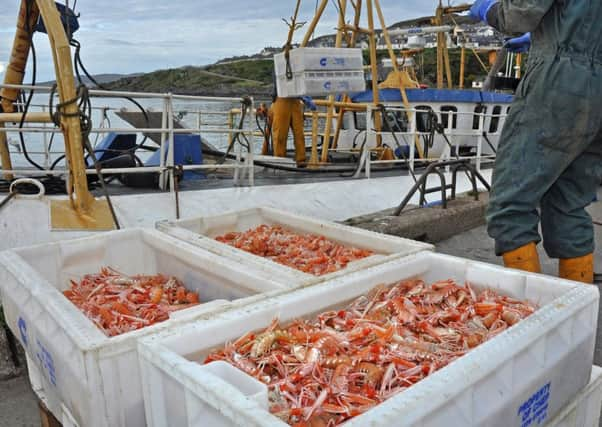Simon Collins: Fishing industry needs management but not by old rules


At a time when the health of our seas has become a serious and global concern, attention has focused on the fishing industry and the way our wild fish stocks are managed. This is not only understandable but perfectly reasonable. Fishing is by no means the only human activity that affects the sea. It’s probably not even the most important one – pollution and greenhouse gas emissions are obvious candidates for that role – but it has to be regulated somewhere. For somewhere like Shetland, where fishing and aquaculture together account for a third of economic activity, the consequences of a free-for-all would be unthinkable.
And there’s the rub, of course. We need rules to manage fishing, but not any old rules. Thought has to go into them, leavened with practical experience of what works and what does not. Obvious? Clearly not obvious enough.
Advertisement
Hide AdAdvertisement
Hide AdThe fact is that the rules determining the what, the how and the when of fishing operations are decided mainly in Brussels by people who have very little contact with the sea, and with the unwelcome help of so-called environmental organisations funded by not entirely spotless multinational corporations. The result is a management regime that lurches between the impractical and the unworkable. Worse, many of the rules handed down to the fishing industry have effects that are precisely the opposite of those intended.
This is top-down policy-making at its worst. It is clearly easier for EU bureaucrats and politicians to seize on ready-made policies dressed up in glossy brochures and slide presentations than it is for them to go out and speak with people who have practical experience of the problems they’re trying to address. And this is why the fishing industry is currently struggling with a discard ban, for example, which creates more problems than it solves.
The ban is a classic top-down policy reflex. It aims to treat symptoms rather than the underlying disease, which is a management system that takes no account of the diversity and productivity of the marine ecosystem. A bottom-up approach that involved fishermen from the start would have grasped that point and arrived at something that made sense to the fishing industry and environmentalists alike. As it stands, it is just a cop-out. It’s like banning wars: all words, merely piffle in the wind.
Touted as a clampdown on waste and a boost for conservation, the prohibition on discarding unwanted fish at sea is still a waste and does nothing for conservation. It does not accept that in highly mixed fisheries different species are typically caught together, and it can be impossible to avoid one of those species and continue catching the rest. The inevitable result is unwanted and unsellable fish being brought ashore to be disposed of there. So why is loading fish into an incinerator not also a waste? How can a seabird, a seal or another fish eat it then?
As for conservation, the discard ban prevents unwanted fish being recycled in the sea – protein put back in the ocean will be eaten by something else – and denies them any chance of survival. Although the regulations state that fish can be returned to the sea if it can be shown that they have a ‘high probability’ of survival, that test is both vague and subject to interminable bureaucratic procedure. The rules also beg the question of why fishers should be forced to land species with any probability of survival – since when is the compulsory killing of fish good for conservation?
And on it goes. When policy is decided in this top-down manner, far from our fishing grounds and the communities that depend on them, such absurdities are bound to arise.
Nobody is claiming that coastal communities should decide fisheries policy. But surely they should have a voice. Like other Scottish fishermen, Shetlanders have been engaged in commercial fishing of one sort or another for around a thousand years or so. Why press on regardless of what all these people might have to say?
It’s not as though bottom-up management doesn’t work. Shetland has been managing its own shellfish stocks for the best part of two decades, using powers granted in a Regulating Order to licence fishing vessels and manage what they can do. The decision-making authority, the board of the Shetland Shellfish Management Organisation (SSMO), is made up of fishermen and local politicians. It also benefits from local scientific advice from NAFC Marine Centre.
Advertisement
Hide AdAdvertisement
Hide AdMore recently, Shetland’s fishing industry teamed up with the Fair Isle community and local environmental organisations to frame proposals for Scotland’s only ‘demonstration and research’ Marine Protected Area.
As with the SSMO, this is a local initiative, not something handed down from on high. It is based on a willingness to work together for the common good.
And unlike the discard ban, it will do what it is intended to do. Back in Brussels, fishing industry representatives are now doing all they can to rescue something workable from the discard ban. Fishermen don’t like discarding fish either, and are keen to arrive at a management regime that delivers conservation as well as economic benefits.
There’s no reason why this can’t be done, but it will need more respect and a bit more humility from our lords and masters. Let’s give bottom-up policy-making a chance.
• Simon Collins is Executive officer of Shetland Fishermen’s Association, www.shetlandfishermen.com